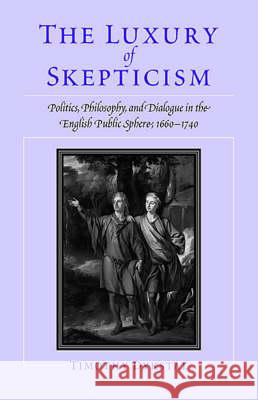The Luxury of Skepticism: Politics, Philosophy, and Dialogue in the English Public Sphere, 1660-1740 » książka
The Luxury of Skepticism: Politics, Philosophy, and Dialogue in the English Public Sphere, 1660-1740
ISBN-13: 9780813920030 / Angielski / Twarda / 2001 / 256 str.
How is it that a controversy about politics becomes a conversation about philosophy? From Hobbes to Harrington to Shaftesbury to Berkeley, Timothy Dykstal explores the public function of the philosophical dialogue at the beginning of England's long eighteenth century. From his close analysis of the works of the era's great philosophers, Dykstal argues that the dialogue as a literary form helped to develop, and subsequently transform, the public sphere in late seventeenth- and early eighteenth-century England.At the beginning of the period, the dialogue gained popularity by representing an answer to the controversies that beset the commonwealth. By the early eighteenth century, however, philosophers were setting their dialogues against the practical world of political mediation and defining a speculative realm that was increasingly private and apolitical. It is in this sense that what was originally a controversy about politics among many dialogue writers--a controversy in search of answers to the questions that plagued civil society--became a -conversation- among a few philosophers that sought to be civil by asking more questions.By describing a period in history when the dialogue was both philosophically speculative and politically engaged, Dykstal revives an important genre in eighteenth-century literature and restores it to its place in the public sphere, that discursive realm in civil society where conflicts of interest are articulated and negotiated.











